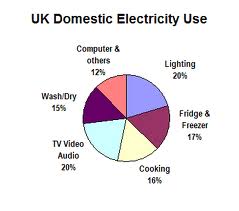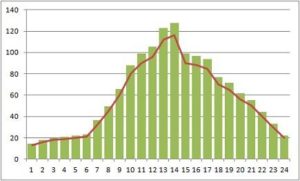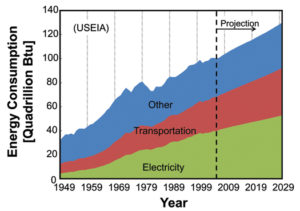 When it comes to appliance energy use and trying to reduce your energy footprint, I like to apply the 80:20 rule. Focus on the things that are going to save me a lot of money vs. those that may save me very little. Once I have gained as much as I can, only if it makes sense from an ROI(return on investment) will I take a look at the smaller savings to be gained. One light bulb may not save much when you convert from incandescent to fluorescent lights. Converting all of your lights can begin to add up. In a previous post, we talked about how converting three lights would save $29 per year. When multiplied across all of our lights inside the home, it would add up to much higher savings.
When it comes to appliance energy use and trying to reduce your energy footprint, I like to apply the 80:20 rule. Focus on the things that are going to save me a lot of money vs. those that may save me very little. Once I have gained as much as I can, only if it makes sense from an ROI(return on investment) will I take a look at the smaller savings to be gained. One light bulb may not save much when you convert from incandescent to fluorescent lights. Converting all of your lights can begin to add up. In a previous post, we talked about how converting three lights would save $29 per year. When multiplied across all of our lights inside the home, it would add up to much higher savings.
What Appliances Cost More to Operate?
So which appliances cost more to run? Well it depends on your personal use of these appliances, the rate you pay for power and of course their energy rating. For example, in our location air conditioning costs us approximately $150 per year. Running ceiling fans may cost us $20 / year for the same period instead of using AC. Cooking with an oven at 350 F 15 days a month for an hour on average may cost us$43. Heating with a microwave will cost us about $32, although a microwave is much more efficient and does not need to be run as long as the oven.
That new plasma TV you leave on all day will cost as much as $88 a year. Reducing the number of hours that you actually watch it will reduce the cost by perhaps half to $44. The same LCD sized TV will cost $20 less or $68 a year to operate with the same assumptions. Even while not on these devices still consume energy, but it only represents a few dollars per year times the number of devices that you actually have.
How to Control Appliance Energy Use
None of these amounts are huge dollars, unless you run your AC for extended times. Many people do have to do in southern climates, it really means that you have to get into the habit of turning things off all of the time. Run your appliances in non peak hours, and convert to less expensive appliances in terms of energy use. This is the only way you are going to get control of your energy cost and minimize this cost as much as possible.
Convert all of your lights that are on a lot to florescent lights. When you purchase appliances, go for the energy efficient ones. When you walk out of a room, turn the lights off, turn the TV off etc. Run your AC less and if you are not at home, turn your AC temperature up so that it is not running unnecessarily.
If possible delay electrical use into non peak times. In our case that means running the dishwasher and the dryer after 7pm at night or on the weekends. I also turn the pool pump off during the day so that the pump is not drawing electricity during the day when rates are at their peak.
Charging Electric Cars
Appliance energy use is just part of the equation. What is about to change is the use of electricity to charge our new cars. Hybrid cars do not require to be charged from the electrical grid, however purely electrical cars must be charged from the grid. The best time to charge these vehicles will be at night when the non peak rates are available. You will save money by driving an electric vehicle. However you can manage this cost as well by controlling when you actually charge the car. In reality it is just another appliance that just uses energy.
As usage goes up and more investment is required. The electrical companies will be increasing their rates even further than they already have. As time goes on it will become even more important to manage your appliances energy use. It will become more important to control your monthly electrical cost. We will be writing a lot more about this subject in coming posts so stay tuned!
For more posts about energy use and how to reduce the energy you use, click here.
 How to manage energy use is all about creating awareness and creating habits. That first step is probably why you are reading this post. You want to learn more about managing energy use and how you can control it! The image on the left came from www.businessenergy.com” at http://www.businessenergy.com/
How to manage energy use is all about creating awareness and creating habits. That first step is probably why you are reading this post. You want to learn more about managing energy use and how you can control it! The image on the left came from www.businessenergy.com” at http://www.businessenergy.com/
